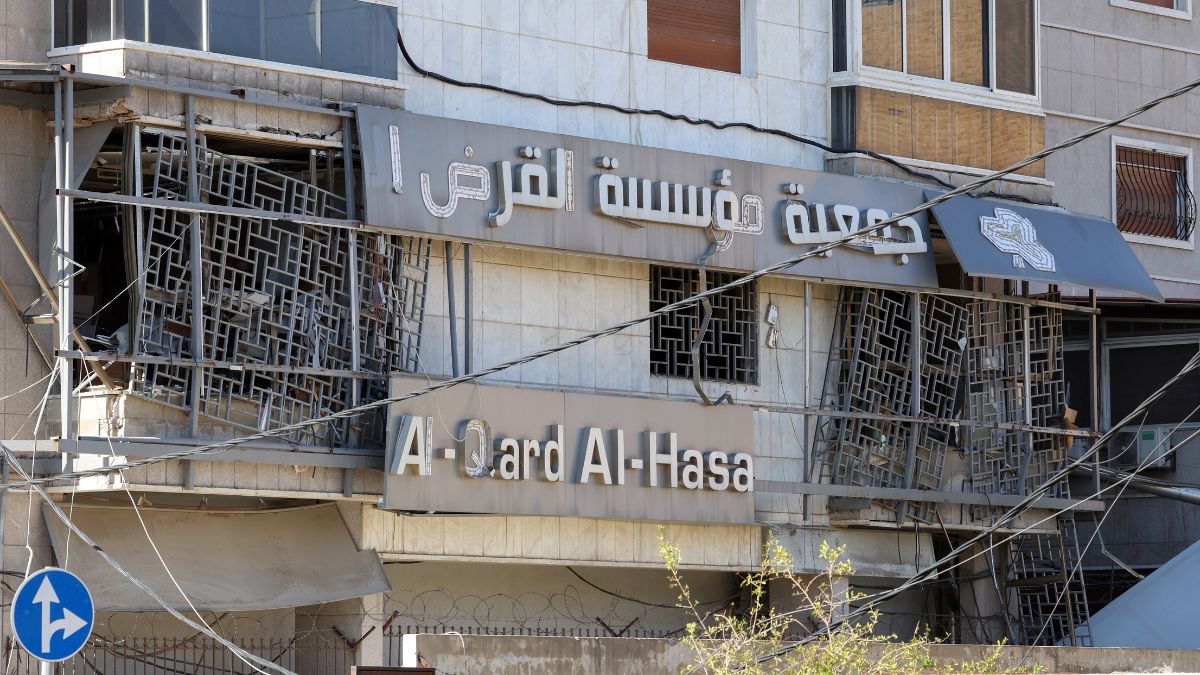Israel has launched a series of airstrikes targeting branches of al-Qard al-Hasan, a financial institution closely linked to Hezbollah early Monday morning. The strikes are part of a broader Israeli effort to weaken the financial and military networks of the Iran-backed Lebanese group.
Rear Admiral Daniel Hagari, an Israeli military spokesman, confirmed that one of the primary targets was a vault located beneath a residential building in Beirut. According to Hagari, the vault held “tens of millions of dollars” intended to finance Hezbollah’s military operations.
On the same day, Israel’s defense minister Yoav Gallant officially designated al-Qard al-Hasan as a terrorist organisation, further isolating it financially.
What is al-Qard al-Hasan?
Founded in 1982, al-Qard al-Hasan began as a charitable institution aimed at providing interest-free loans based on Islamic finance principles, which prohibit usury. Its name, translating to “benevolent loan,” reflects its initial purpose of offering small loans, typically no more than $5,000, to individuals in need.
Over time, the institution grew to provide a wide array of financial services, including savings accounts, financial transfers, and payments processing. It now has more than 30 branches spread across Lebanon, primarily in Shiite-dominated areas like Beirut and the Bekaa Valley.
While al-Qard al-Hasan presents itself as a charitable entity, it plays a far more intricate role in Hezbollah’s financial ecosystem. The US Department of the Treasury imposed sanctions on the institution in 2007, accusing it of being a cover for Hezbollah’s financial activities, including money laundering and arms financing.
AP quoted David Asher, an expert on illicit financing, “Al-Qard al-Hasan is part of Hezbollah’s central financial unit, akin to its treasury.” Despite these allegations, al-Qard al-Hasan has become a critical financial lifeline for many Lebanese, especially following the country’s financial collapse in 2019.
Unlike traditional banks, which imposed severe withdrawal limits, al-Qard al-Hasan allowed customers to access their funds. This made the institution even more popular among low-income Lebanese citizens, particularly in Hezbollah’s strongholds.
How did al-Qard al-Hasan get impacted by Israeli strikes?
Israel’s recent airstrikes, which reportedly destroyed more than a dozen al-Qard al-Hasan branches, mark a dramatic escalation in its efforts to disrupt Hezbollah’s financial operations. Israeli officials have described the institution as a critical node in Hezbollah’s funding network.
The airstrikes come just weeks after an Israeli airstrike killed Mohammed Jaafar Qassir, a top Hezbollah financier accused of funnelling hundreds of millions of dollars from Iran to Hezbollah.
Despite these attacks, experts question how much damage they will inflict on Hezbollah’s overall financial structure. According to Lebanese economist Louis Hobeika, Hezbollah’s main source of funding comes from Iran and wealthy international donors.
“As long as Iran and Hezbollah’s allies are funding the group, it will not be affected,” Hobeika told AP, highlighting that Hezbollah’s finances are largely conducted in cash. Al-Qard al-Hasan, meanwhile, attempted to reassure its customers, issuing a statement that all gold deposits and valuable assets had been relocated to safe areas before the airstrikes.
How are Hezbollah and al-Qard al-Hasan linked?
While al-Qard al-Hasan is often depicted as a financial tool for Hezbollah, its impact on ordinary Lebanese citizens cannot be ignored.
Hundreds of thousands of people rely on the institution for loans and savings, many of whom have been excluded from the traditional banking system. The institution offers flexibility in repayment, which has helped people cover essential expenses like education, weddings, and starting small businesses.
Hezbollah has actively encouraged Lebanese of all sects to use al-Qard al-Hasan, especially as the country’s economic crisis worsened.
In 2020, after al-Qard al-Hasan’s customer data was leaked in a cyberattack, Hezbollah leader Sayyed Hassan Nasrallah, who was killed in an Israeli airstrike in September 2023, urged supporters to deposit their money in the institution to counteract efforts to destabilise it. “They want to scare you,” Nasrallah said at the time, “but this institution is protected by Hezbollah.”
However, al-Qard al-Hasan’s relationship with Hezbollah’s military wing has drawn significant scrutiny. US sanctions have specifically targeted individuals linked to the institution, including its director, Adel Mansour.
Mansour had previously told AP that the US sanctions were “a medal of honour” for him.
Israel has also claimed that Hezbollah is storing hundreds of millions of dollars in cash and gold in a bunker beneath a hospital in Beirut’s southern suburbs. However, Israel stated that it has no plans to target the facility.
Following the accusation, Sahel Hospital in Dahiyeh was evacuated. Its director, Fadi Alame, denied the allegations in a statement to Reuters, calling them false.
What next?
The Israeli airstrikes on al-Qard al-Hasan come in the wake of a broader campaign to weaken Hezbollah’s military and financial apparatus.
The strikes are the latest in a series of targeted operations, including the assassinations of key Hezbollah figures like Qassir and his brother, Hasan, who was married to the daughter of Hezbollah’s late leader. Israel’s strategy seems focused on eroding Hezbollah’s support base by cutting off its financial lifelines.
Still, analysts believe that the destruction of al-Qard al-Hasan branches, while symbolically significant, will not be a fatal blow to Hezbollah.
Faysal Abdul-Sater, a Lebanese political analyst, dismissed the attacks as “symbolic,” noting that Hezbollah’s core funding comes from external sources. Nevertheless, the systematic destruction of Hezbollah’s financial infrastructure is likely to create uncertainty among its supporters, many of whom rely on al-Qard al-Hasan for essential financial services.
With inputs from agencies


)

)
)
)
)
)
)
)
)



